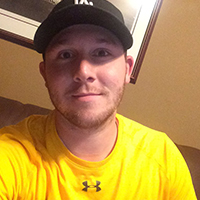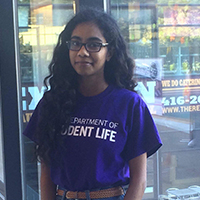Yasna Kharadi
Majors: Human Geography and City Studies Co-op
Minor: Geographic Information Systems
What factors contributed to you choosing your program(s)?
When I first joined UTSC, I didn’t plan on taking Geography at all. I just happened to take a first year course as an elective and fell in love with the discipline. The topics we learn are all interesting and relevant to issues in the real world. The faculty is extremely supportive and encouraging, and all the other students in the program are friendly and accepting. I chose to pursue the program as a major coupled with City Studies, and a minor in Geographic Information Systems (GIS). These three programs work really well together as there is good combination of theory, application, and real world skills that can be learned.
Can you describe your program(s)? What is it actually like?
Many people think that Geography is about learning countries on a map, but it actually isn’t like that at all. There are many different types of Geographies including physical, urban, human, and cultural. Geography is about understanding the world around us, including concepts such as urbanization, globalization, migration patterns, changes to the environment, and inequalities of space. One of the highlights of this program is that it can be taken as a specialist, major, or minor. It can also be coupled with City Studies and be part of the co-op program. This allows students to take part in two competitive work terms with employers such as Environment Canada, Metrolinx, Ontario Energy Board, Ontario Power Generation, and many more. By doing so, students get an opportunity to apply their knowledge in real work environments and gain valuable experience. The curriculum for Geography is really diverse and students can pursue a broad range of interests. The first year Geography courses set strong foundations in understanding the different concepts and theories, while the upper year courses allow students to branch out in topics such as land development, megacities, health and sexuality, spaces of travel, and many more. This allows students to gain a breadth of knowledge they can use in their career path.
What tips/advice can you provide to students just starting or considering this program(s)?
- Be involved in activities other than academics. Get to know the departmental associations, go to their events, they’re catered for students and their needs. Join a club or sports team, go to mix and mingles, talk to professors. All of this enhances the student experience. It helps in making friends and connections that are valuable, and you’ll enjoy your time in university much more.
- Assignments and readings are hard so don’t be afraid to get help. Academic writing is a tough skill to learn but it’s an important aspect for your success. There are many services available on campus such as the Writing Centre, or workshops that teach students how to build these skills. It’s important to start assignments early so there’s enough time for editing. Readings are part of this as well as they help in understanding the material on a much deeper level. Take the time to question who the author is, why their perspective is the way it is, what in the reading is challenging, and what are the limitations within the reading. All of this facilitates critical thinking needed for academic success.
What will you do with your degree after graduation?
Geography is inter-disciplinary and has the ability to be incorporated anywhere. Upon graduation, I would like to take a year or two to work and gain experience before possibly perusing a Masters. I participated in the co-op program and had the opportunity to work with the Ontario Energy Board for 8 months. I would like to return there and continue to learn and participate in the public sector. Geography prepares students with important skills in research, writing, and evidence-based examination of our surrounding environment. These skills can be transferred to many jobs, and gives students the ability to apply them in the real world.
What has your academic journey during your time been like as you progress toward graduation?
For my first year, I took courses from all disciplines including Environmental Science, Health Studies, and International Development. By doing so I knew what disciplines I liked and possibly wanted to pursue and which ones I didn’t. I also tried to attend and participate in events because it’s really beneficial to talk to upper year students and hear their perspective and advice. Second year, I started to get more involved as I joined my departmental student association as a Second Year Representative. The courses I was taking were more detailed and therefore more interesting. It was at this point that I really started to get the hang of academic writing and the skills for critical thinking. By doing so, I was able to engage better in all my courses and learn about subjects I was passionate about. Third and fourth year courses are tailored by themes and there’s a wide variety of options for students to choose from. The class sizes are much smaller and intimate so I got to know my professors and classmates a lot better. Many fourth year courses are seminar based and students get to share their thoughts and experiences in an open environment. This type of learning is much more personal and much more rewarding.

Marcus Rozsa
Major:Human Geography
Minors: History and Sociology
What factors contributed to you choosing your program(s)?
I have always been interested in the relationship between humans and their immediate geographic context, and how that differs from place to place depending on factors such as social values, governmental policies, and the historical past of such places. Through the diversity of their course offerings, the department of Human Geography allowed me to explore these concepts in an elaborate manner.
Can you describe your program(s)? What is it actually like?
As just briefly alluded to, Human Geography is extremely wide-ranging. The department offers courses focusing on broad issues such as our own understanding of the environment, how power is distributed throughout urban regions, and how education differs depending on geography. However, the department also offers courses that narrow in on specific topics, including the development of the Toronto region, and land reform in South Africa. In all, each course will ultimately focus on the relationship between people and place, in both abstract and legitimate terms.
What tips/advice can you provide to students just starting or considering this program(s)?
- Keep an open mind. Human Geography courses will challenge you to understand material through a number of different lenses. Keeping an open mind will make this process much easier.
- Keep up with the readings. Reading, while not overwhelming, provides a whole new layer of insight that assists in clarifying lecture material. Succeeding in class becomes immensely easier when you supplement lecture material with reading material.
What will you do with your degree after graduation? (Future plans?)
I will be attending law school beginning next September.
What has your academic journey during your time been like as you progress toward graduation?I actually began my post-secondary academic journey at a college in Ohio playing baseball on a scholarship. While not declaring a major there, I did take a number of geography courses which originally sparked my interest in the field. After transferring to UTSC and entering the Human Geography program, the courses I was taking were exactly what I was looking for. They were both mentally stimulating and very enjoyable. Admittedly, it did take about a semester for me to adjust from a college curriculum to a university one, but I did eventually adapt to the learning style, and eventually began to excel in it. I am now in my final semester at UTSC.

Meena Sivaneswaralingam
Major: Human GeographyMinors: Critical Migration Studies & Public Law
What factors contributed to you choosing your program(s)?Personal interests.Can you describe your program(s)? What is it actually like?
They are very fun and interesting. The best part is that these programs allow you to apply theories to current world issues and helps students better understand them. In addition, the professors support
student’s ideas and opinions, and provide opportunities to share them through publications, research, conferences and much more.
What tips/advice can you provide to students just starting or considering this program(s)?
- Talk to your professors about their research. Their research may interest you and you can conduct your own research through independent research courses, or even be part of their current research.
- Join Departmental Student Associations! They always have so much to offer which is relevant to the programs and course work.
- There are many opportunities where you can use what you learn in class to the work field. Co-op placements, personal research, work-study programs, and even CTLB03 "Introduction to Service Learning"
What will you do with your degree after graduation? (Future plans?)
Hopefully, I will pursue a Master’s degree and continue to conduct research on immigration and human geography.
What has your academic journey during your time been like as you progress toward graduation?
- I knew my interests but wasn't sure what programs would match them.
- Discovered the programs that I am currently enrolled in and started to specialize. I also started my own research and found work experiences that correlated with my interests.
- Continued doing well in my programs and networked with faculty and professionals. Immersed myself into more work-study positions that allowed me to incorporate course concepts into my work.
- Finishing up my programs and conducting research with colleagues. As well as being in the work-study program and continuing to connect course content to my work-study positions.